mirror of
https://github.com/isar/libmdbx.git
synced 2025-01-04 18:44:13 +08:00
633 lines
30 KiB
Markdown
633 lines
30 KiB
Markdown
<!-- Required extensions: pymdownx.betterem, pymdownx.tilde, pymdownx.emoji, pymdownx.tasklist, pymdownx.superfences -->
|
|
|
|
libmdbx
|
|
========
|
|
|
|
> Please refer to the online [documentation](https://erthink.github.io/libmdbx/)
|
|
> with [`C` API description](https://erthink.github.io/libmdbx/group__c__api.html)
|
|
> and pay attention to the preliminary [`C++` API](https://github.com/erthink/libmdbx/blob/c%2B%2B/mdbx.h%2B%2B).
|
|
> Questions, feedback and suggestions are welcome to the [Telergam' group](https://t.me/libmdbx).
|
|
|
|
<!-- section-begin overview -->
|
|
_libmdbx_ is an extremely fast, compact, powerful, embedded,
|
|
transactional [key-value database](https://en.wikipedia.org/wiki/Key-value_database),
|
|
with [permissive license](./LICENSE).
|
|
_MDBX_ has a specific set of properties and capabilities,
|
|
focused on creating unique lightweight solutions.
|
|
|
|
1. Allows **a swarm of multi-threaded processes to
|
|
[ACID]((https://en.wikipedia.org/wiki/ACID))ly read and update** several
|
|
key-value [maps](https://en.wikipedia.org/wiki/Associative_array) and
|
|
[multimaps](https://en.wikipedia.org/wiki/Multimap) in a locally-shared
|
|
database.
|
|
|
|
2. Provides **extraordinary performance**, minimal overhead through
|
|
[Memory-Mapping](https://en.wikipedia.org/wiki/Memory-mapped_file) and
|
|
`Olog(N)` operations costs by virtue of [B+
|
|
tree](https://en.wikipedia.org/wiki/B%2B_tree).
|
|
|
|
3. Requires **no maintenance and no crash recovery** since it doesn't use
|
|
[WAL](https://en.wikipedia.org/wiki/Write-ahead_logging), but that might
|
|
be a caveat for write-intensive workloads with durability requirements.
|
|
|
|
4. **Compact and friendly for fully embedding**. Only 25KLOC of `C11`,
|
|
64K x86 binary code, no internal threads neither processes, but
|
|
implements a simplified variant of the [Berkeley
|
|
DB](https://en.wikipedia.org/wiki/Berkeley_DB) and
|
|
[dbm](https://en.wikipedia.org/wiki/DBM_(computing)) API.
|
|
|
|
5. Enforces [serializability](https://en.wikipedia.org/wiki/Serializability) for
|
|
writers just by single
|
|
[mutex](https://en.wikipedia.org/wiki/Mutual_exclusion) and affords
|
|
[wait-free](https://en.wikipedia.org/wiki/Non-blocking_algorithm#Wait-freedom)
|
|
for parallel readers without atomic/interlocked operations, while
|
|
**writing and reading transactions do not block each other**.
|
|
|
|
6. **Guarantee data integrity** after crash unless this was explicitly
|
|
neglected in favour of write performance.
|
|
|
|
7. Supports Linux, Windows, MacOS, Android, iOS, FreeBSD, DragonFly, Solaris,
|
|
OpenSolaris, OpenIndiana, NetBSD, OpenBSD and other systems compliant with
|
|
**POSIX.1-2008**.
|
|
<!-- section-end -->
|
|
|
|
Historically, _MDBX_ is a deeply revised and extended descendant of the amazing
|
|
[Lightning Memory-Mapped Database](https://en.wikipedia.org/wiki/Lightning_Memory-Mapped_Database).
|
|
_MDBX_ inherits all benefits from _LMDB_, but resolves some issues and adds [a set of improvements](#improvements-beyond-lmdb).
|
|
|
|
<!-- section-begin mithril -->
|
|
The next version is under active non-public development from scratch and will be
|
|
released as _**MithrilDB**_ and `libmithrildb` for libraries & packages.
|
|
Admittedly mythical [Mithril](https://en.wikipedia.org/wiki/Mithril) is
|
|
resembling silver but being stronger and lighter than steel. Therefore
|
|
_MithrilDB_ is a rightly relevant name.
|
|
> _MithrilDB_ will be radically different from _libmdbx_ by the new
|
|
> database format and API based on C++17, as well as the [Apache 2.0
|
|
> License](https://www.apache.org/licenses/LICENSE-2.0). The goal of this
|
|
> revolution is to provide a clearer and robust API, add more features and
|
|
> new valuable properties of the database.
|
|
<!-- section-end -->
|
|
|
|
[](https://t.me/libmdbx)
|
|
[](https://travis-ci.org/erthink/libmdbx)
|
|
[](https://ci.appveyor.com/project/leo-yuriev/libmdbx/branch/master)
|
|
[](https://circleci.com/gh/erthink/libmdbx/tree/master)
|
|
[](https://scan.coverity.com/projects/reopen-libmdbx)
|
|
[](https://cirrus-ci.com/github/erthink/libmdbx)
|
|
|
|
*The Future will (be) [Positive](https://www.ptsecurity.com). Всё будет хорошо.*
|
|
|
|
-----
|
|
|
|
## Table of Contents
|
|
- [Characteristics](#characteristics)
|
|
- [Features](#features)
|
|
- [Limitations](#limitations)
|
|
- [Gotchas](#gotchas)
|
|
- [Comparison with other databases](#comparison-with-other-databases)
|
|
- [Improvements beyond LMDB](#improvements-beyond-lmdb)
|
|
- [History & Acknowledgments](#history)
|
|
- [Usage](#usage)
|
|
- [Building](#building)
|
|
- [API description](#api-description)
|
|
- [Bindings](#bindings)
|
|
- [Performance comparison](#performance-comparison)
|
|
- [Integral performance](#integral-performance)
|
|
- [Read scalability](#read-scalability)
|
|
- [Sync-write mode](#sync-write-mode)
|
|
- [Lazy-write mode](#lazy-write-mode)
|
|
- [Async-write mode](#async-write-mode)
|
|
- [Cost comparison](#cost-comparison)
|
|
|
|
# Characteristics
|
|
|
|
<!-- section-begin characteristics -->
|
|
|
|
## Features
|
|
|
|
- Key-value data model, keys are always sorted.
|
|
|
|
- Fully [ACID](https://en.wikipedia.org/wiki/ACID)-compliant, through to
|
|
[MVCC](https://en.wikipedia.org/wiki/Multiversion_concurrency_control)
|
|
and [CoW](https://en.wikipedia.org/wiki/Copy-on-write).
|
|
|
|
- Multiple key-value sub-databases within a single datafile.
|
|
|
|
- Range lookups, including range query estimation.
|
|
|
|
- Efficient support for short fixed length keys, including native 32/64-bit integers.
|
|
|
|
- Ultra-efficient support for [multimaps](https://en.wikipedia.org/wiki/Multimap). Multi-values sorted, searchable and iterable. Keys stored without duplication.
|
|
|
|
- Data is [memory-mapped](https://en.wikipedia.org/wiki/Memory-mapped_file) and accessible directly/zero-copy. Traversal of database records is extremely-fast.
|
|
|
|
- Transactions for readers and writers, ones do not block others.
|
|
|
|
- Writes are strongly serialized. No transaction conflicts nor deadlocks.
|
|
|
|
- Readers are [non-blocking](https://en.wikipedia.org/wiki/Non-blocking_algorithm), notwithstanding [snapshot isolation](https://en.wikipedia.org/wiki/Snapshot_isolation).
|
|
|
|
- Nested write transactions.
|
|
|
|
- Reads scale linearly across CPUs.
|
|
|
|
- Continuous zero-overhead database compactification.
|
|
|
|
- Automatic on-the-fly database size adjustment.
|
|
|
|
- Customizable database page size.
|
|
|
|
- `Olog(N)` cost of lookup, insert, update, and delete operations by virtue of [B+ tree characteristics](https://en.wikipedia.org/wiki/B%2B_tree#Characteristics).
|
|
|
|
- Online hot backup.
|
|
|
|
- Append operation for efficient bulk insertion of pre-sorted data.
|
|
|
|
- No [WAL](https://en.wikipedia.org/wiki/Write-ahead_logging) nor any
|
|
transaction journal. No crash recovery needed. No maintenance is required.
|
|
|
|
- No internal cache and/or memory management, all done by basic OS services.
|
|
|
|
## Limitations
|
|
|
|
- **Page size**: a power of 2, maximum `65536` bytes, default `4096` bytes.
|
|
- **Key size**: minimum 0, maximum ≈¼ pagesize (`1300` bytes for default 4K pagesize, `21780` bytes for 64K pagesize).
|
|
- **Value size**: minimum 0, maximum `2146435072` (`0x7FF00000`) bytes for maps, ≈¼ pagesize for multimaps (`1348` bytes default 4K pagesize, `21828` bytes for 64K pagesize).
|
|
- **Write transaction size**: up to `4194301` (`0x3FFFFD`) pages (16 [GiB](https://en.wikipedia.org/wiki/Gibibyte) for default 4K pagesize, 256 [GiB](https://en.wikipedia.org/wiki/Gibibyte) for 64K pagesize).
|
|
- **Database size**: up to `2147483648` pages (8 [TiB](https://en.wikipedia.org/wiki/Tebibyte) for default 4K pagesize, 128 [TiB](https://en.wikipedia.org/wiki/Tebibyte) for 64K pagesize).
|
|
- **Maximum sub-databases**: `32765`.
|
|
|
|
## Gotchas
|
|
|
|
1. There cannot be more than one writer at a time, i.e. no more than one write transaction at a time.
|
|
|
|
2. MDBX is based on [B+ tree](https://en.wikipedia.org/wiki/B%2B_tree), so access to database pages is mostly random.
|
|
Thus SSDs provide a significant performance boost over spinning disks for large databases.
|
|
|
|
3. MDBX uses [shadow paging](https://en.wikipedia.org/wiki/Shadow_paging) instead of [WAL](https://en.wikipedia.org/wiki/Write-ahead_logging). Thus syncing data to disk might be a bottleneck for write intensive workload.
|
|
|
|
4. MDBX uses [copy-on-write](https://en.wikipedia.org/wiki/Copy-on-write) for [snapshot isolation](https://en.wikipedia.org/wiki/Snapshot_isolation) during updates, but read transactions prevents recycling an old retired/freed pages, since it read ones. Thus altering of data during a parallel
|
|
long-lived read operation will increase the process work set, may exhaust entire free database space,
|
|
the database can grow quickly, and result in performance degradation.
|
|
Try to avoid long running read transactions.
|
|
|
|
5. MDBX is extraordinarily fast and provides minimal overhead for data access,
|
|
so you should reconsider using brute force techniques and double check your code.
|
|
On the one hand, in the case of MDBX, a simple linear search may be more profitable than complex indexes.
|
|
On the other hand, if you make something suboptimally, you can notice detrimentally only on sufficiently large data.
|
|
|
|
## Comparison with other databases
|
|
For now please refer to [chapter of "BoltDB comparison with other
|
|
databases"](https://github.com/coreos/bbolt#comparison-with-other-databases)
|
|
which is also (mostly) applicable to _libmdbx_.
|
|
|
|
<!-- section-end -->
|
|
<!-- section-begin improvements -->
|
|
|
|
Improvements beyond LMDB
|
|
========================
|
|
|
|
_libmdbx_ is superior to legendary _[LMDB](https://symas.com/lmdb/)_ in
|
|
terms of features and reliability, not inferior in performance. In
|
|
comparison to _LMDB_, _libmdbx_ make things "just work" perfectly and
|
|
out-of-the-box, not silently and catastrophically break down. The list
|
|
below is pruned down to the improvements most notable and obvious from
|
|
the user's point of view.
|
|
|
|
## Added Features
|
|
|
|
1. Keys could be more than 2 times longer than _LMDB_.
|
|
> For DB with default page size _libmdbx_ support keys up to 1300 bytes
|
|
> and up to 21780 bytes for 64K page size. _LMDB_ allows key size up to
|
|
> 511 bytes and may silently loses data with large values.
|
|
|
|
2. Up to 20% faster than _LMDB_ in [CRUD](https://en.wikipedia.org/wiki/Create,_read,_update_and_delete) benchmarks.
|
|
> Benchmarks of the in-[tmpfs](https://en.wikipedia.org/wiki/Tmpfs) scenarios,
|
|
> that tests the speed of the engine itself, showned that _libmdbx_ 10-20% faster than _LMDB_.
|
|
> These and other results could be easily reproduced with [ioArena](https://github.com/pmwkaa/ioarena) just by `make bench-quartet` command,
|
|
> including comparisons with [RockDB](https://en.wikipedia.org/wiki/RocksDB)
|
|
> and [WiredTiger](https://en.wikipedia.org/wiki/WiredTiger).
|
|
|
|
3. Automatic on-the-fly database size adjustment, both increment and reduction.
|
|
> _libmdbx_ manages the database size according to parameters specified
|
|
> by `mdbx_env_set_geometry()` function,
|
|
> ones include the growth step and the truncation threshold.
|
|
>
|
|
> Unfortunately, on-the-fly database size adjustment doesn't work under [Wine](https://en.wikipedia.org/wiki/Wine_(software))
|
|
> due to its internal limitations and unimplemented functions, i.e. the `MDBX_UNABLE_EXTEND_MAPSIZE` error will be returned.
|
|
|
|
4. Automatic continuous zero-overhead database compactification.
|
|
> During each commit _libmdbx_ merges suitable freeing pages into unallocated area
|
|
> at the end of file, and then truncates unused space when a lot enough of.
|
|
|
|
5. The same database format for 32- and 64-bit builds.
|
|
> _libmdbx_ database format depends only on the [endianness](https://en.wikipedia.org/wiki/Endianness) but not on the [bitness](https://en.wiktionary.org/wiki/bitness).
|
|
|
|
6. LIFO policy for Garbage Collection recycling. This can significantly increase write performance due write-back disk cache up to several times in a best case scenario.
|
|
> LIFO means that for reuse will be taken the latest becames unused pages.
|
|
> Therefore the loop of database pages circulation becomes as short as possible.
|
|
> In other words, the set of pages, that are (over)written in memory and on disk during a series of write transactions, will be as small as possible.
|
|
> Thus creates ideal conditions for the battery-backed or flash-backed disk cache efficiency.
|
|
|
|
7. Fast estimation of range query result volume, i.e. how many items can
|
|
be found between a `KEY1` and a `KEY2`. This is a prerequisite for build
|
|
and/or optimize query execution plans.
|
|
> _libmdbx_ performs a rough estimate based on common B-tree pages of the paths from root to corresponding keys.
|
|
|
|
8. `mdbx_chk` tool for database integrity check.
|
|
|
|
9. Automated steady sync-to-disk upon several thresholds and/or timeout via cheap polling.
|
|
|
|
10. Sequence generation and three persistent 64-bit markers.
|
|
|
|
11. Callback for lack-of-space condition of database that allows you to control and/or resolve such situations.
|
|
|
|
12. Support for opening databases in the exclusive mode, including on a network share.
|
|
|
|
## Added Abilities
|
|
|
|
1. Zero-length for keys and values.
|
|
|
|
2. Ability to determine whether the particular data is on a dirty page
|
|
or not, that allows to avoid copy-out before updates.
|
|
|
|
3. Ability to determine whether the cursor is pointed to a key-value
|
|
pair, to the first, to the last, or not set to anything.
|
|
|
|
4. Extended information of whole-database, sub-databases, transactions, readers enumeration.
|
|
> _libmdbx_ provides a lot of information, including dirty and leftover pages
|
|
> for a write transaction, reading lag and holdover space for read transactions.
|
|
|
|
5. Extended update and delete operations.
|
|
> _libmdbx_ allows one _at once_ with getting previous value
|
|
> and addressing the particular item from multi-value with the same key.
|
|
|
|
## Other fixes and specifics
|
|
|
|
1. Fixed more than 10 significant errors, in particular: page leaks,
|
|
wrong sub-database statistics, segfault in several conditions,
|
|
nonoptimal page merge strategy, updating an existing record with
|
|
a change in data size (including for multimap), etc.
|
|
|
|
2. All cursors can be reused and should be closed explicitly,
|
|
regardless ones were opened within a write or read transaction.
|
|
|
|
3. Opening database handles are spared from race conditions and
|
|
pre-opening is not needed.
|
|
|
|
4. Returning `MDBX_EMULTIVAL` error in case of ambiguous update or delete.
|
|
|
|
5. Guarantee of database integrity even in asynchronous unordered write-to-disk mode.
|
|
> _libmdbx_ propose additional trade-off by `MDBX_SAFE_NOSYNC` with append-like manner for updates,
|
|
> that avoids database corruption after a system crash contrary to LMDB.
|
|
> Nevertheless, the `MDBX_UTTERLY_NOSYNC` mode is available to match behaviour of the `MDB_NOSYNC` in LMDB.
|
|
|
|
6. On **MacOS & iOS** the `fcntl(F_FULLFSYNC)` syscall is used _by
|
|
default_ to synchronize data with the disk, as this is [the only way to
|
|
guarantee data
|
|
durability](https://developer.apple.com/library/archive/documentation/System/Conceptual/ManPages_iPhoneOS/man2/fsync.2.html)
|
|
in case of power failure. Unfortunately, in scenarios with high write
|
|
intensity, the use of `F_FULLFSYNC` significantly degrades performance
|
|
compared to LMDB, where the `fsync()` syscall is used. Therefore,
|
|
_libmdbx_ allows you to override this behavior by defining the
|
|
`MDBX_OSX_SPEED_INSTEADOF_DURABILITY=1` option while build the library.
|
|
|
|
7. On **Windows** the `LockFileEx()` syscall is used for locking, since
|
|
it allows place the database on network drives, and provides protection
|
|
against incompetent user actions (aka
|
|
[poka-yoke](https://en.wikipedia.org/wiki/Poka-yoke)). Therefore
|
|
_libmdbx_ may be a little lag in performance tests from LMDB where the
|
|
named mutexes are used.
|
|
|
|
<!-- section-end -->
|
|
<!-- section-begin history -->
|
|
|
|
# History
|
|
|
|
Historically, _MDBX_ is a deeply revised and extended descendant of the
|
|
[Lightning Memory-Mapped Database](https://en.wikipedia.org/wiki/Lightning_Memory-Mapped_Database).
|
|
At first the development was carried out within the
|
|
[ReOpenLDAP](https://github.com/erthink/ReOpenLDAP) project. About a
|
|
year later _libmdbx_ was separated into a standalone project, which was
|
|
[presented at Highload++ 2015
|
|
conference](http://www.highload.ru/2015/abstracts/1831.html).
|
|
|
|
Since 2017 _libmdbx_ is used in [Fast Positive Tables](https://github.com/erthink/libfpta),
|
|
and development is funded by [Positive Technologies](https://www.ptsecurity.com).
|
|
|
|
## Acknowledgments
|
|
Howard Chu <hyc@openldap.org> is the author of LMDB, from which
|
|
originated the MDBX in 2015.
|
|
|
|
Martin Hedenfalk <martin@bzero.se> is the author of `btree.c` code, which
|
|
was used to begin development of LMDB.
|
|
|
|
<!-- section-end -->
|
|
|
|
--------------------------------------------------------------------------------
|
|
|
|
Usage
|
|
=====
|
|
|
|
<!-- section-begin usage -->
|
|
Currently, libmdbx is only available in a
|
|
[source code](https://en.wikipedia.org/wiki/Source_code) form.
|
|
Packages support for common Linux distributions is planned in the future,
|
|
since release the version 1.0.
|
|
|
|
## Source code embedding
|
|
|
|
_libmdbx_ provides two official ways for integration in source code form:
|
|
|
|
1. Using the amalgamated source code.
|
|
> The amalgamated source code includes all files required to build and
|
|
> use _libmdbx_, but not for testing _libmdbx_ itself.
|
|
|
|
2. Adding the complete original source code as a `git submodule`.
|
|
> This allows you to build as _libmdbx_ and testing tool.
|
|
> On the other hand, this way requires you to pull git tags, and use C++11 compiler for test tool.
|
|
|
|
_**Please, avoid using any other techniques.**_ Otherwise, at least
|
|
don't ask for support and don't name such chimeras `libmdbx`.
|
|
|
|
The amalgamated source code could be created from the original clone of git
|
|
repository on Linux by executing `make dist`. As a result, the desired
|
|
set of files will be formed in the `dist` subdirectory.
|
|
|
|
## Building
|
|
|
|
Both amalgamated and original source code provides build through the use
|
|
[CMake](https://cmake.org/) or [GNU
|
|
Make](https://www.gnu.org/software/make/) with
|
|
[bash](https://en.wikipedia.org/wiki/Bash_(Unix_shell)). All build ways
|
|
are completely traditional and have minimal prerequirements like
|
|
`build-essential`, i.e. the non-obsolete C/C++ compiler and a
|
|
[SDK](https://en.wikipedia.org/wiki/Software_development_kit) for the
|
|
target platform. Obviously you need building tools itself, i.e. `git`,
|
|
`cmake` or GNU `make` with `bash`.
|
|
|
|
So just using CMake or GNU Make in your habitual manner and feel free to
|
|
fill an issue or make pull request in the case something will be
|
|
unexpected or broken down.
|
|
|
|
#### DSO/DLL unloading and destructors of Thread-Local-Storage objects
|
|
When building _libmdbx_ as a shared library or use static _libmdbx_ as a
|
|
part of another dynamic library, it is advisable to make sure that your
|
|
system ensures the correctness of the call destructors of
|
|
Thread-Local-Storage objects when unloading dynamic libraries.
|
|
|
|
If this is not the case, then unloading a dynamic-link library with
|
|
_libmdbx_ code inside, can result in either a resource leak or a crash
|
|
due to calling destructors from an already unloaded DSO/DLL object. The
|
|
problem can only manifest in a multithreaded application, which makes
|
|
the unloading of shared dynamic libraries with _libmdbx_ code inside,
|
|
after using _libmdbx_. It is known that TLS-destructors are properly
|
|
maintained in the following cases:
|
|
|
|
- On all modern versions of Windows (Windows 7 and later).
|
|
|
|
- On systems with the
|
|
[`__cxa_thread_atexit_impl()`](https://sourceware.org/glibc/wiki/Destructor%20support%20for%20thread_local%20variables)
|
|
function in the standard C library, including systems with GNU libc
|
|
version 2.18 and later.
|
|
|
|
- On systems with libpthread/ntpl from GNU libc with bug fixes
|
|
[#21031](https://sourceware.org/bugzilla/show_bug.cgi?id=21031) and
|
|
[#21032](https://sourceware.org/bugzilla/show_bug.cgi?id=21032), or
|
|
where there are no similar bugs in the pthreads implementation.
|
|
|
|
### Linux and other platforms with GNU Make
|
|
To build the library it is enough to execute `make all` in the directory
|
|
of source code, and `make check` to execute the basic tests.
|
|
|
|
If the `make` installed on the system is not GNU Make, there will be a
|
|
lot of errors from make when trying to build. In this case, perhaps you
|
|
should use `gmake` instead of `make`, or even `gnu-make`, etc.
|
|
|
|
### FreeBSD and related platforms
|
|
As a rule, in such systems, the default is to use Berkeley Make. And GNU
|
|
Make is called by the gmake command or may be missing. In addition,
|
|
[bash](https://en.wikipedia.org/wiki/Bash_(Unix_shell)) may be absent.
|
|
|
|
You need to install the required components: GNU Make, bash, C and C++
|
|
compilers compatible with GCC or CLANG. After that, to build the
|
|
library, it is enough to execute `gmake all` (or `make all`) in the
|
|
directory with source code, and `gmake check` (or `make check`) to run
|
|
the basic tests.
|
|
|
|
### Windows
|
|
For build _libmdbx_ on Windows the _original_ CMake and [Microsoft Visual
|
|
Studio 2019](https://en.wikipedia.org/wiki/Microsoft_Visual_Studio) are
|
|
recommended. Otherwise do not forget to add `ntdll.lib` to linking.
|
|
|
|
Building by MinGW, MSYS or Cygwin is potentially possible. However,
|
|
these scripts are not tested and will probably require you to modify the
|
|
CMakeLists.txt or Makefile respectively.
|
|
|
|
It should be noted that in _libmdbx_ was efforts to resolve
|
|
runtime dependencies from CRT and other libraries Visual Studio.
|
|
For this is enough to define the `MDBX_AVOID_CRT` during build.
|
|
|
|
An example of running a basic test script can be found in the
|
|
[CI-script](appveyor.yml) for [AppVeyor](https://www.appveyor.com/). To
|
|
run the [long stochastic test scenario](test/long_stochastic.sh),
|
|
[bash](https://en.wikipedia.org/wiki/Bash_(Unix_shell)) is required, and
|
|
such testing is recommended with placing the test data on the
|
|
[RAM-disk](https://en.wikipedia.org/wiki/RAM_drive).
|
|
|
|
### Windows Subsystem for Linux
|
|
_libmdbx_ could be used in [WSL2](https://en.wikipedia.org/wiki/Windows_Subsystem_for_Linux#WSL_2)
|
|
but NOT in [WSL1](https://en.wikipedia.org/wiki/Windows_Subsystem_for_Linux#WSL_1) environment.
|
|
This is a consequence of the fundamental shortcomings of _WSL1_ and cannot be fixed.
|
|
To avoid data loss, _libmdbx_ returns the `ENOLCK` (37, "No record locks available")
|
|
error when opening the database in a _WSL1_ environment.
|
|
|
|
### MacOS
|
|
Current [native build tools](https://en.wikipedia.org/wiki/Xcode) for
|
|
MacOS include GNU Make, CLANG and an outdated version of bash.
|
|
Therefore, to build the library, it is enough to run `make all` in the
|
|
directory with source code, and run `make check` to execute the base
|
|
tests. If something goes wrong, it is recommended to install
|
|
[Homebrew](https://brew.sh/) and try again.
|
|
|
|
To run the [long stochastic test scenario](test/long_stochastic.sh), you
|
|
will need to install the current (not outdated) version of
|
|
[bash](https://en.wikipedia.org/wiki/Bash_(Unix_shell)). To do this, we
|
|
recommend that you install [Homebrew](https://brew.sh/) and then execute
|
|
`brew install bash`.
|
|
|
|
### Android
|
|
We recommend using CMake to build _libmdbx_ for Android.
|
|
Please refer to the [official guide](https://developer.android.com/studio/projects/add-native-code).
|
|
|
|
### iOS
|
|
To build _libmdbx_ for iOS, we recommend using CMake with the
|
|
"[toolchain file](https://cmake.org/cmake/help/latest/variable/CMAKE_TOOLCHAIN_FILE.html)"
|
|
from the [ios-cmake](https://github.com/leetal/ios-cmake) project.
|
|
|
|
<!-- section-end -->
|
|
|
|
## API description
|
|
|
|
Please refer to the online [_libmdbx_ API reference](https://erthink.github.io/libmdbx/)
|
|
and/or see the [mdbx.h](mdbx.h) header.
|
|
|
|
<!-- section-begin bindings -->
|
|
|
|
Bindings
|
|
========
|
|
|
|
| Runtime | GitHub | Author |
|
|
| ------- | ------ | ------ |
|
|
| Rust | [mdbx-rs](https://github.com/Kerollmops/mdbx-rs) | [Clément Renault](https://github.com/Kerollmops) |
|
|
| Java | [mdbxjni](https://github.com/castortech/mdbxjni) | [Castor Technologies](https://castortech.com/) |
|
|
| .NET | [mdbx.NET](https://github.com/wangjia184/mdbx.NET) | [Jerry Wang](https://github.com/wangjia184) |
|
|
|
|
<!-- section-end -->
|
|
|
|
--------------------------------------------------------------------------------
|
|
|
|
<!-- section-begin performance -->
|
|
|
|
Performance comparison
|
|
======================
|
|
|
|
All benchmarks were done in 2015 by [IOArena](https://github.com/pmwkaa/ioarena)
|
|
and multiple [scripts](https://github.com/pmwkaa/ioarena/tree/HL%2B%2B2015)
|
|
runs on Lenovo Carbon-2 laptop, i7-4600U 2.1 GHz (2 physical cores, 4 HyperThreading cores), 8 Gb RAM,
|
|
SSD SAMSUNG MZNTD512HAGL-000L1 (DXT23L0Q) 512 Gb.
|
|
|
|
## Integral performance
|
|
|
|
Here showed sum of performance metrics in 3 benchmarks:
|
|
|
|
- Read/Search on the machine with 4 logical CPUs in HyperThreading mode (i.e. actually 2 physical CPU cores);
|
|
|
|
- Transactions with [CRUD](https://en.wikipedia.org/wiki/CRUD)
|
|
operations in sync-write mode (fdatasync is called after each
|
|
transaction);
|
|
|
|
- Transactions with [CRUD](https://en.wikipedia.org/wiki/CRUD)
|
|
operations in lazy-write mode (moment to sync data to persistent storage
|
|
is decided by OS).
|
|
|
|
*Reasons why asynchronous mode isn't benchmarked here:*
|
|
|
|
1. It doesn't make sense as it has to be done with DB engines, oriented
|
|
for keeping data in memory e.g. [Tarantool](https://tarantool.io/),
|
|
[Redis](https://redis.io/)), etc.
|
|
|
|
2. Performance gap is too high to compare in any meaningful way.
|
|
|
|
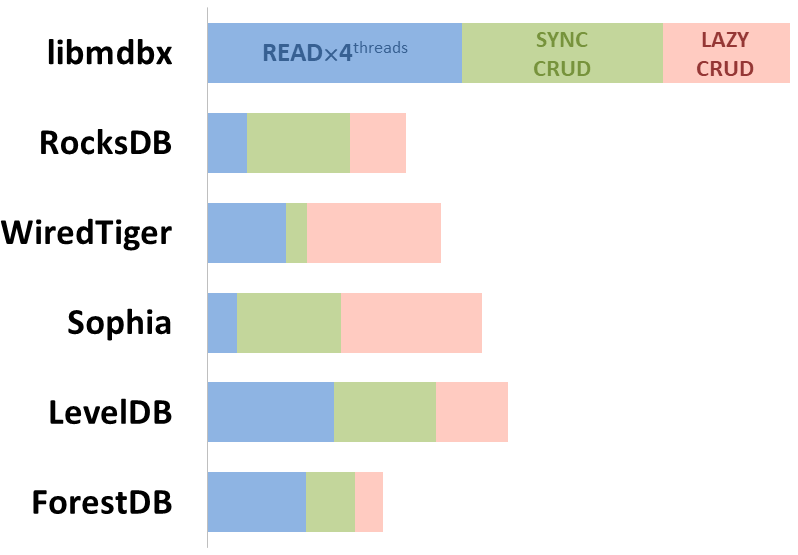
|
|
|
|
--------------------------------------------------------------------------------
|
|
|
|
## Read Scalability
|
|
|
|
Summary performance with concurrent read/search queries in 1-2-4-8
|
|
threads on the machine with 4 logical CPUs in HyperThreading mode (i.e. actually 2 physical CPU cores).
|
|
|
|
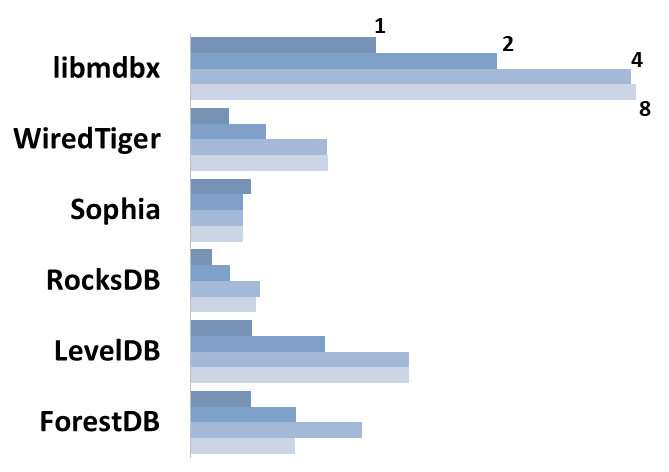
|
|
|
|
--------------------------------------------------------------------------------
|
|
|
|
## Sync-write mode
|
|
|
|
- Linear scale on left and dark rectangles mean arithmetic mean
|
|
transactions per second;
|
|
|
|
- Logarithmic scale on right is in seconds and yellow intervals mean
|
|
execution time of transactions. Each interval shows minimal and maximum
|
|
execution time, cross marks standard deviation.
|
|
|
|
**10,000 transactions in sync-write mode**. In case of a crash all data
|
|
is consistent and conforms to the last successful transaction. The
|
|
[fdatasync](https://linux.die.net/man/2/fdatasync) syscall is used after
|
|
each write transaction in this mode.
|
|
|
|
In the benchmark each transaction contains combined CRUD operations (2
|
|
inserts, 1 read, 1 update, 1 delete). Benchmark starts on an empty database
|
|
and after full run the database contains 10,000 small key-value records.
|
|
|
|
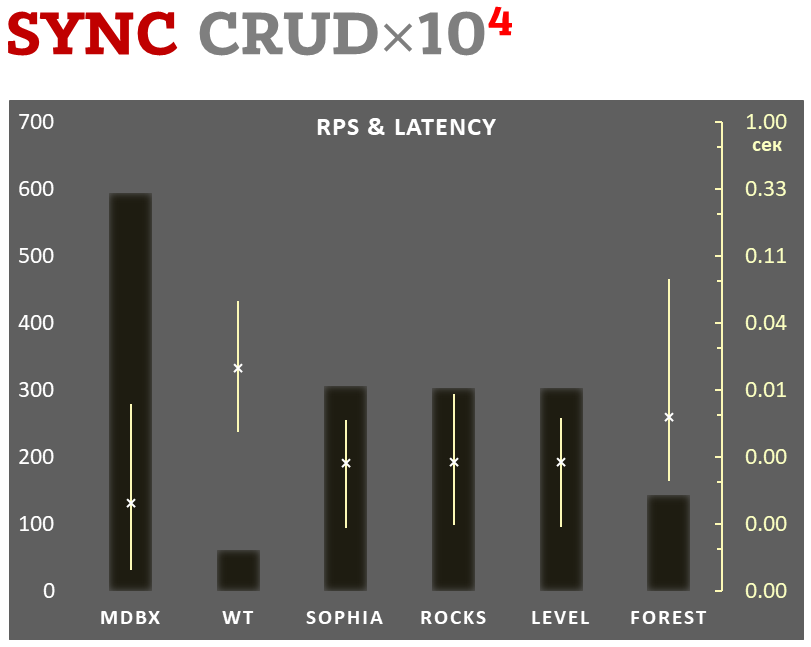
|
|
|
|
--------------------------------------------------------------------------------
|
|
|
|
## Lazy-write mode
|
|
|
|
- Linear scale on left and dark rectangles mean arithmetic mean of
|
|
thousands transactions per second;
|
|
|
|
- Logarithmic scale on right in seconds and yellow intervals mean
|
|
execution time of transactions. Each interval shows minimal and maximum
|
|
execution time, cross marks standard deviation.
|
|
|
|
**100,000 transactions in lazy-write mode**. In case of a crash all data
|
|
is consistent and conforms to the one of last successful transactions, but
|
|
transactions after it will be lost. Other DB engines use
|
|
[WAL](https://en.wikipedia.org/wiki/Write-ahead_logging) or transaction
|
|
journal for that, which in turn depends on order of operations in the
|
|
journaled filesystem. _libmdbx_ doesn't use WAL and hands I/O operations
|
|
to filesystem and OS kernel (mmap).
|
|
|
|
In the benchmark each transaction contains combined CRUD operations (2
|
|
inserts, 1 read, 1 update, 1 delete). Benchmark starts on an empty database
|
|
and after full run the database contains 100,000 small key-value
|
|
records.
|
|
|
|
|
|
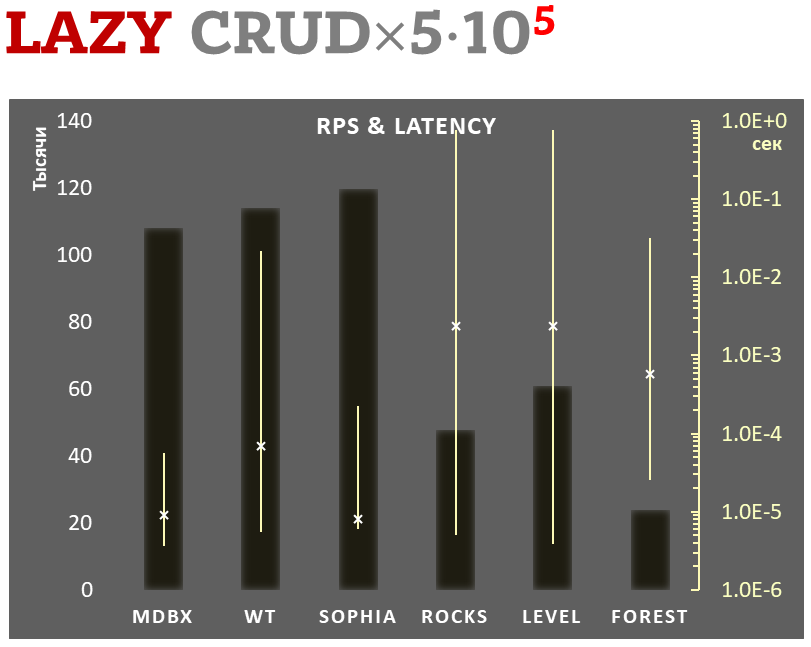
|
|
|
|
--------------------------------------------------------------------------------
|
|
|
|
## Async-write mode
|
|
|
|
- Linear scale on left and dark rectangles mean arithmetic mean of
|
|
thousands transactions per second;
|
|
|
|
- Logarithmic scale on right in seconds and yellow intervals mean
|
|
execution time of transactions. Each interval shows minimal and maximum
|
|
execution time, cross marks standard deviation.
|
|
|
|
**1,000,000 transactions in async-write mode**. In case of a crash all data is consistent and conforms to the one of last successful transactions, but lost transaction count is much higher than in
|
|
lazy-write mode. All DB engines in this mode do as little writes as
|
|
possible on persistent storage. _libmdbx_ uses
|
|
[msync(MS_ASYNC)](https://linux.die.net/man/2/msync) in this mode.
|
|
|
|
In the benchmark each transaction contains combined CRUD operations (2
|
|
inserts, 1 read, 1 update, 1 delete). Benchmark starts on an empty database
|
|
and after full run the database contains 10,000 small key-value records.
|
|
|
|
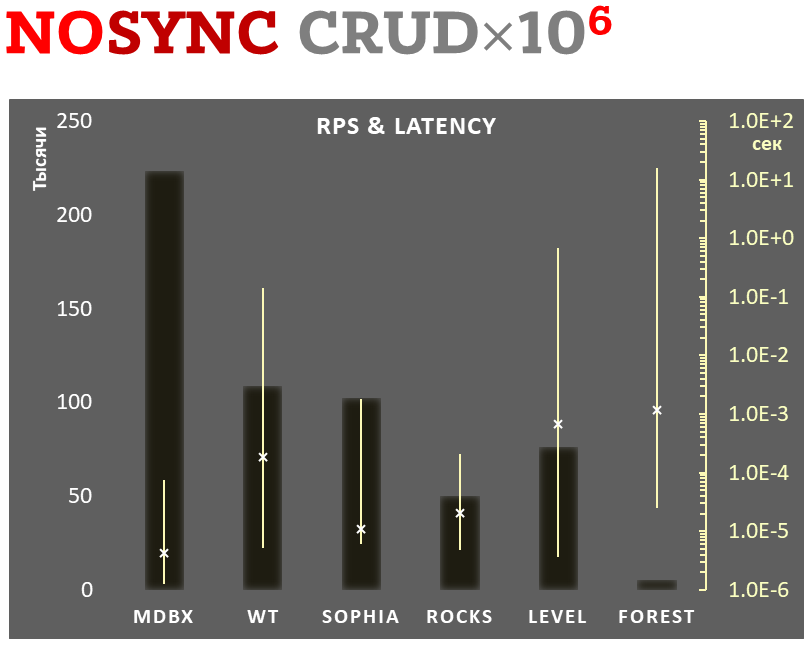
|
|
|
|
--------------------------------------------------------------------------------
|
|
|
|
## Cost comparison
|
|
|
|
Summary of used resources during lazy-write mode benchmarks:
|
|
|
|
- Read and write IOPs;
|
|
|
|
- Sum of user CPU time and sys CPU time;
|
|
|
|
- Used space on persistent storage after the test and closed DB, but not
|
|
waiting for the end of all internal housekeeping operations (LSM
|
|
compactification, etc).
|
|
|
|
_ForestDB_ is excluded because benchmark showed it's resource
|
|
consumption for each resource (CPU, IOPs) much higher than other engines
|
|
which prevents to meaningfully compare it with them.
|
|
|
|
All benchmark data is gathered by
|
|
[getrusage()](http://man7.org/linux/man-pages/man2/getrusage.2.html)
|
|
syscall and by scanning the data directory.
|
|
|
|
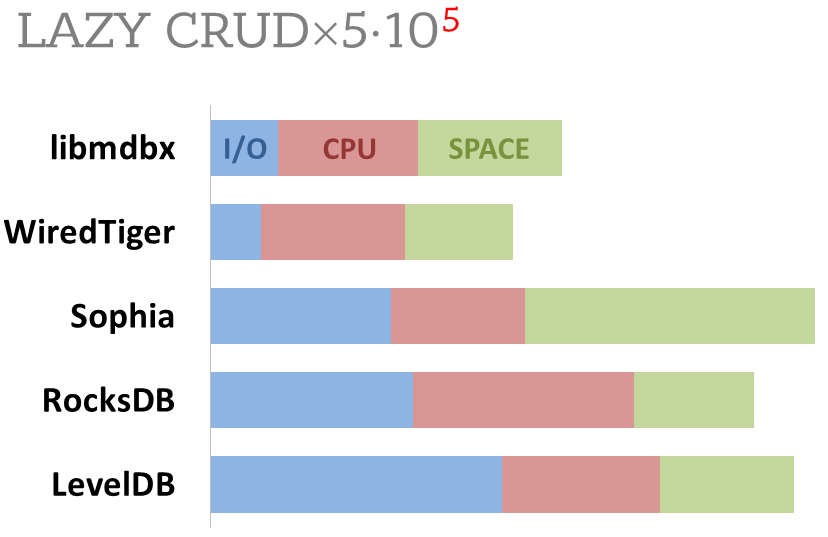
|
|
|
|
<!-- section-end -->
|
|
|
|
--------------------------------------------------------------------------------
|
|
|
|
#### This is a mirror of the origin repository that was moved to [abf.io](https://abf.io/erthink/) because of discriminatory restrictions for Russian Crimea.
|